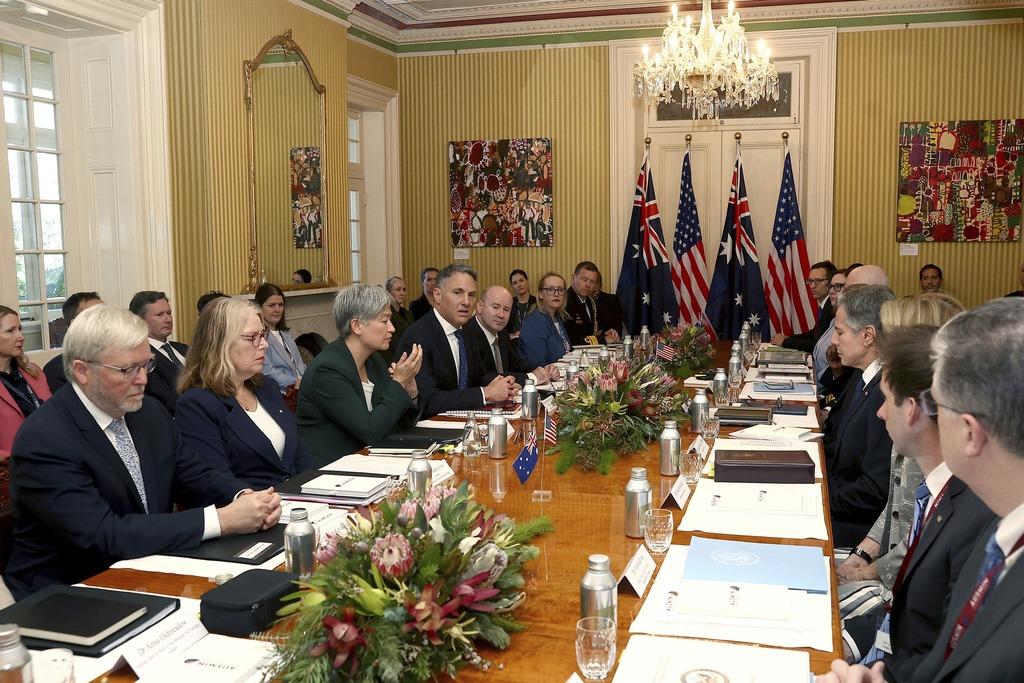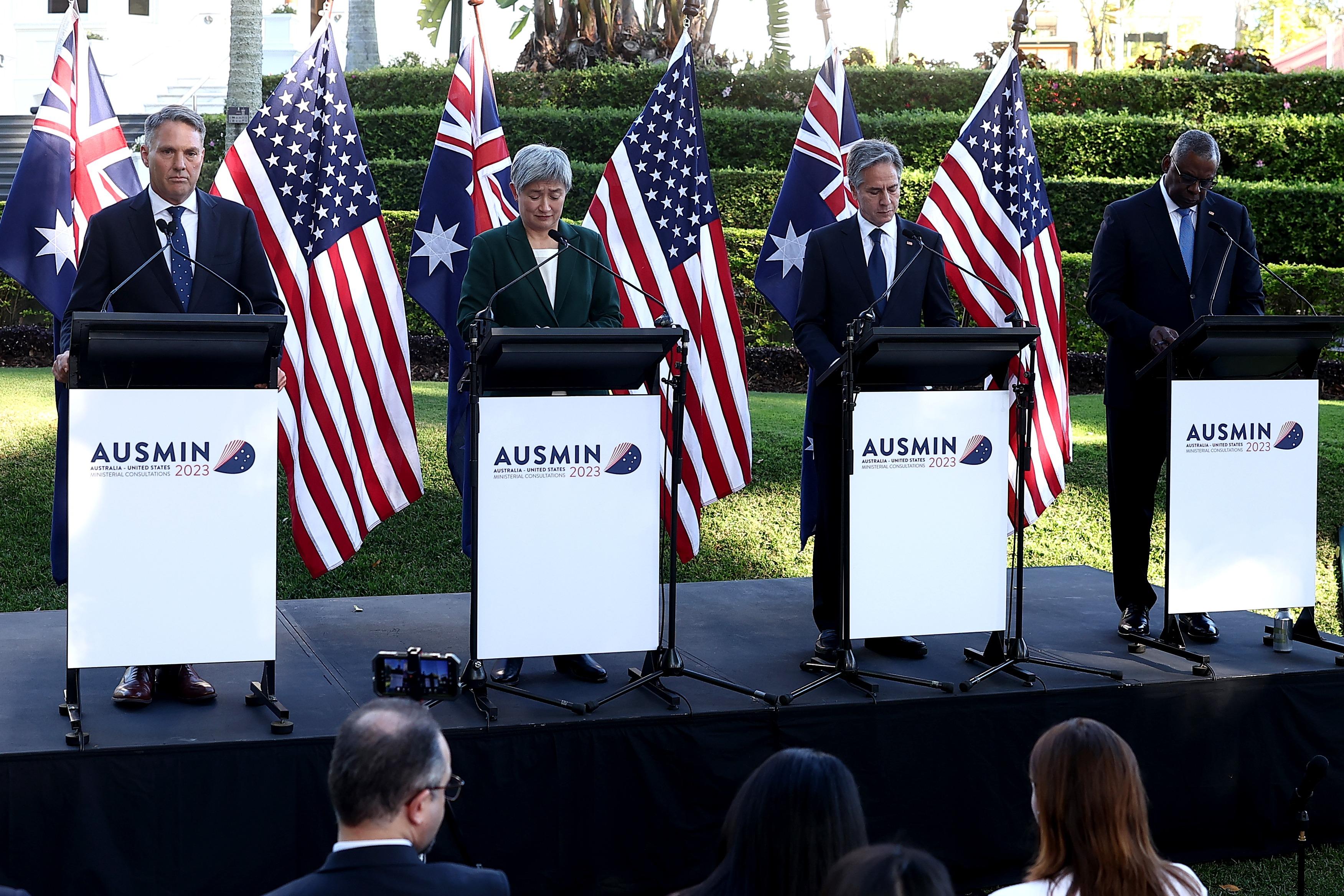 Australia's Defense Minister Richard Marles (center left) addresses US Secretary of State Antony Blinken (center right) and U.S. Secretary of Defense Lloyd Austin as Australia's Foreign Minister Penny Wong (left of Marles) looks on during Session I at Queensland Government House in Brisbane, Australia, on July 29, 2023. (PHOTO / AP)
Australia's Defense Minister Richard Marles (center left) addresses US Secretary of State Antony Blinken (center right) and U.S. Secretary of Defense Lloyd Austin as Australia's Foreign Minister Penny Wong (left of Marles) looks on during Session I at Queensland Government House in Brisbane, Australia, on July 29, 2023. (PHOTO / AP)
On Aug 4 the curtain will come down on one of the biggest military exercises held in the southern hemisphere – Talisman Sabre.
Some 30,000 troops including observers from 13 countries took part in the “war games” which began on July 22. It served as a curtain raiser to the AUSMin (Australia-United States Ministers) talks between defense ministers Richard Marles of Australia and Lloyd Austin of the US, Australia’s foreign minister Penny Wong, and US Secretary of State Anthony Blinken.
Very little has been made public from the AUSMin talks apart from a US commitment to defend military bases in northern Australia where the US plans to rotate long-range, nuclear-capable B-52 bombers and the proposal to jointly manufacture medium-range missiles in Australia.
But the talks underscore just how committed the Australian Labor government has become to the US military build-up in the region, which some analysts have warned against.
Joining Australia and the United States are South Korea, Japan, New Zealand, Canada, the UK, France and Germany. As US allies, they are all contributing, with varying degrees of enthusiasm to a multi-layered US-led ‘Indo-Pacific strategy’ whose clear aim is to contain China and preserve US regional and global dominance.
Emeritus professor Joseph Camilleri OAM at the La Trobe University, Melbourne, and fellow of the Academy of the Social Sciences in Australia
Talisman Sabre is part of a bigger story, said La Trobe University, Melbourne, emeritus professor Joseph Camilleri OAM and fellow of the Academy of the Social Sciences in Australia.
“Joining Australia and the United States are South Korea, Japan, New Zealand, Canada, the UK, France and Germany. As US allies, they are all contributing, with varying degrees of enthusiasm to a multi-layered US-led ‘Indo-Pacific strategy’ whose clear aim is to contain China and preserve US regional and global dominance,” he told China Daily.
“Talisman Sabre has a sobering message for the Asia-Pacific community. We are on a slippery slope which can only lead to the increasingly dangerous militarisation of the region.
“We need to steer the ship in a different direction. The Asia-Pacific community, its governments, and its peoples must call for both the Pacific and Indian Oceans to be declared Zones of Peace, and for existing nuclear weapons-free zones to be strengthened and new ones to be established.
“Importantly, it is time for increasingly provocative displays of firepower to be replaced by innovative and sustained confidence-building, conflict resolution, peacekeeping, and mediation efforts,” he said.
ALSO READ: Helicopter crash puts key Australia-US war games on hold
Alison Broinowski, a former diplomat and president of Australians for War Powers Reform, described the exercises as “a display of military capacity, increasingly aimed at China. It is also a showcase for the arms industries, mainly American.”
“The US always wants a coalition for its wars, and its planned next one is against China. Australia appears to be putting our 'sovereign' territory in the line of fire if the US goes to war against China, as a proxy target. We could face the prospect of being Asia's Ukraine.”
 (From left) Australian Defence Minister Richard Marles, Australian Foreign Minister Penny Wong, US Secretary of State Antony Blinken and US Secretary of Defense Lloyd Austin attend a Press Conference at Queensland Government House in Brisbane on July 29, 2023. (PHOTO / AFP)
(From left) Australian Defence Minister Richard Marles, Australian Foreign Minister Penny Wong, US Secretary of State Antony Blinken and US Secretary of Defense Lloyd Austin attend a Press Conference at Queensland Government House in Brisbane on July 29, 2023. (PHOTO / AFP)
Broinowski said China has not sent troops to another country since its brief battle with Vietnam in 1978.
The US always wants a coalition for its wars, and its planned next one is against China. Australia appears to be putting our "sovereign" territory in the line of fire if the US goes to war against China, as a proxy target. We could face the prospect of being Asia's Ukraine.
Alison Broinowski, a former diplomat and president of Australians for War Powers Reform
“Australia and the US have invaded several, most illegally,” she added.
“If Australian governments treat China as an enemy, it will respond as one. We will outlast the US in this region, and we have to live with it, for Australia's survival. Australia has one last chance to seek peaceful cohabitation with our Asian region. Allowing the US to choose our enemies for us will not achieve that.”
The joint exercises have been going on for 18 years, mainly with Australian and US troops, but this year they have involved many countries and heralded a flurry of diplomatic activity in the Pacific.Japan’s Self-Defense Forces drilled live firing of missiles from a foreign soil during the joint exercises this time, although the Japanese Ministry of Defense states in its website, that “as a general rule, the Constitution does not permit armed troops to be dispatched to the land, sea, or airspace of other countries with the aim of using force”.
US Defense Secretary Austin was also in Papua New Guinea on July 27 where he reiterated Washington’s claim that the US is not seeking to build a permanent base.
US Secretary of State Blinken held bilateral talks in Tonga on July 26, the first time a US Secretary of State had visited the tiny Pacific kingdom.
On July 27, Blinken was in New Zealand for talks with his Kiwi counterpart Nanaia Mahuta, where the door was opened for possible New Zealand involvement in the AUKUS (Australia-United Kingdom-United States) nuclear military alliance.
READ MORE: Cambodian PM: AUKUS 'becoming concern' for ASEAN
It was made clear that New Zealand, due to its anti-nuclear stance, would not be involved in the nuclear submarine program, which Australia has signed up for but is now looking increasingly uncertain.
The AUKUS agreement has seen opposition in the US Congress over the sale of nuclear submarine technology to Australia, as well as in Australia.
Broinowski, the former diplomat, said Australian Prime Minister Anthony Albanese has “failed to listen to growing opposition to AUKUS in Australia” and elsewhere.
“It has failed to endorse reform of the way Australia goes to war. Australians are concerned that AUKUS will involve nuclear-capable submarines, aircraft, and torpedoes being based in Australia, with no control by the Australian government over what they may do,” she said.


